
The creation and achievements of the European Chamber Shanghai Chapter
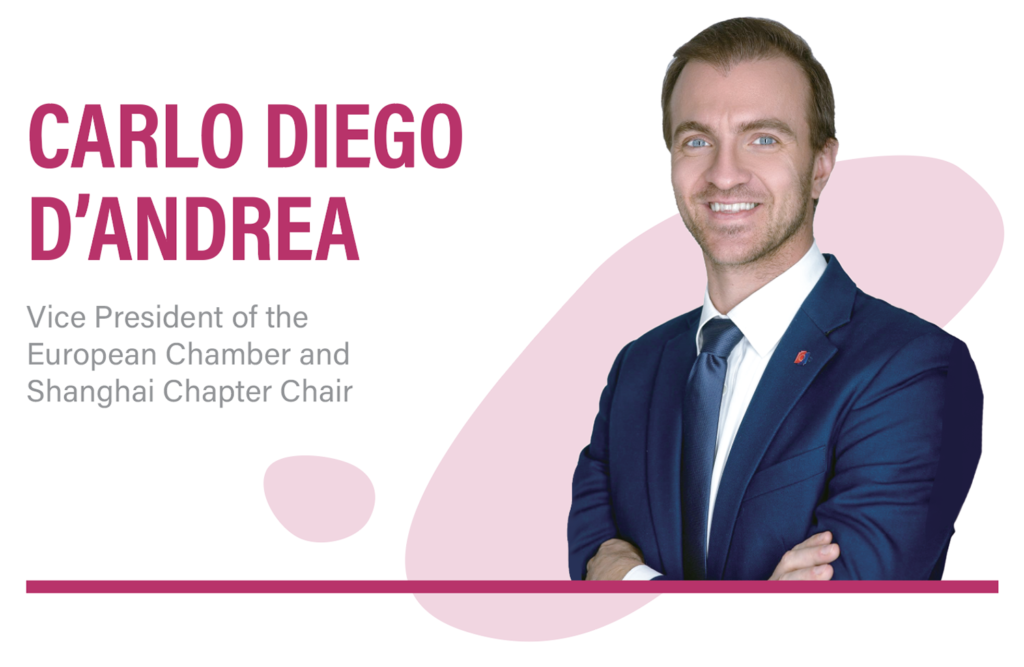
Carlo Diego D’Andrea
Q: How long have you been in China?
CDD: I have lived in China for 15 years.
What’s the difference between China’s business/regulatory environment in your industry today vs. 20 years ago?
I am involved in the legal sector, therefore, in the past 20 years, we have seen very few steps towards opening up the market in our sector.
What changes do you expect to see in China’s business/regulatory environment in the next 20 years?
Rather than what I expect to see, what I dream of seeing and hope for regarding my industry is fair and equal treatment, a country where rule of law is the norm, where notions such as negative lists and areas of business in which foreign investment is refused are greatly reduced, and less involvement from state-owned enterprises in the business environment.
What role do you foresee the European Chamber taking in the next 20 years?
I count on the European Chamber continuing to be the voice of European business striving forward, not to be ‘pandahuggers’, always adopting a proactive role while standing beside European businesses in order to build bridges – not only between European and Chinese businesses, but also with the Chinese authorities. Ultimately, being a vehicle for improvements in the legal and business frameworks of China.
What value has the European Chamber brought to you/your company/your industry?
The Chamber brings the attention of Chinese leadership to the legal field, adding value to our industry. I still remember when I was the chair of the Legal and Competition Working Group, the president of the European Commission at that time, Jean-Claude Juncker, at the European Union (EU)-China Business Summit in Beijing, directly posed a question to Chinese Premier Li Keqiang asking for the reasoning behind the exclusion of European lawyers and law firms from the market in China. I remember this as a great opportunity the Chamber provided for our field; however, we have seen only small improvements since that time.
What’s your favourite experience from your time at the European Chamber?
The first time we had a hearing in the European Parliament in Brussels, I was one of the European Chamber delegation, and being there to speak to EU leaders was truly a powerful moment and indeed a great memory.
Do you remember the first government meeting you attended with the European Chamber, who it was with and how were you received?
Well, we are talking about a very long time ago, but I remember it was a meeting with the Nanjing mayor, when I was still a young practitioner having just arrived in China.
What memories do you have from the first time you took part in the drafting of a Position Paper?
Truly an important moment, a lot of work to be completed, but nonetheless important to do so as everyone from European to Chinese leaders reads it. Just to be clear, it is not a simple cut-and-paste job; every year, we try to improve upon the previous edition to enhance the European business environment in China.
Do you feel that the Chinese authorities care about the Chamber’s messaging and recommendations?
Yes, they do. I know they care about it and I’ll give you an example. When I went to Brussels in 2018, the new Chinese Ambassador to the EU, Zhang Ming, said in our meeting that he had very much wanted to meet the European Union Chamber of Commerce in China delegation. He mentioned that every time he discusses China with his EU counterparts, they all say they understand his points but that the European Chamber’s Position Paper notes other perspectives regarding the same subject, and he is asked for his opinion on those.
A moment of pride for the work of the European Chamber, perfectly showcasing what we are doing to improve the European business environment in China.
Piter de Jong
Q: How long have you been in China?
PDJ: I lived in China from 1998 to 2016. I was board member of the European Chamber Shanghai Chapter from 2007 to 2010 and Shanghai Chair from 2010 to 2013.
How did you first get involved in the European Chamber’s work and what were some of the main challenges then?
I first got involved in the European Chamber via the Banking Working Group. As branch manager of ING Bank N.V. Shanghai Branch, I found it very useful to exchange ideas with people from other European banks. We were competitors, but at the same time, we were in the same boat: trying to increase the market share of foreign banks in China. The regulatory environment was very unstable and often unclear. Exchanging information with peers was very helpful.
In its 20-year history, what would you say is the European Chamber’s biggest accomplishment?
Providing a consistent channel for dialogue between the Chinese Government and European businesses. Over the years, the Chamber has built up a reputation for quality comments and suggestions on the regulatory environment, via the Position Papers. This has made [the Chamber] an interesting counterparty for Chinese regulators at many levels. As a result, the Chamber is able to make a difference for its members. The impact was often very specific and sometimes very local. Major changes are always difficult, but practical solutions to make life easier for European businesses were mostly possible. The devil is always in the details, in the detailed implementation of rules, rather than the general law. This is where working groups, with deep, practical insights into the issues, can deliver value to the European Chamber’s members.
What’s the difference in China’s business/regulatory environment in your industry today vs. 20 years ago?
In banking, there has been constant change in the regulatory environment. When I started in banking in Shanghai in 1998, foreign banks were encouraged to expand. There was no renminbi lending licence yet; we were no threat to anyone. The regulator was quite interested in how foreign banks operated and often copied our internal guidelines and manuals as examples and teaching materials for local banks. That all changed after the banking crises in 2008. Foreign banks were no longer considered shining examples of compliance and prudent banking. Increasingly, the regulator imposed very strict local regulations on foreign banks, often crippling their business models. During my years in Shanghai, the market share of all foreign banks never exceeded two per cent. The knowledge and capacity of the regulator has increased significantly over the years.
How do you expect China’s business/regulatory environment to change in the next 20 years?
Sooner or later, but likely within 20 years, China will open up its stock market to foreign companies and make the renminbi fully convertible. This will be a major move forward whereby Shanghai will be able to retake its position as the leading global financial centre in Asia. The Shanghai Chapter released an interesting paper, Asia-Pacific Headquarters Study (2011), comparing Shanghai to Hong Kong and Singapore. Many key issues mentioned in that paper have since been resolved. I expect the Chinese regulatory environment to continue to be rife with ‘Chinese characteristics’, and the European Chamber to remain relevant to both its members and the Chinese Government.
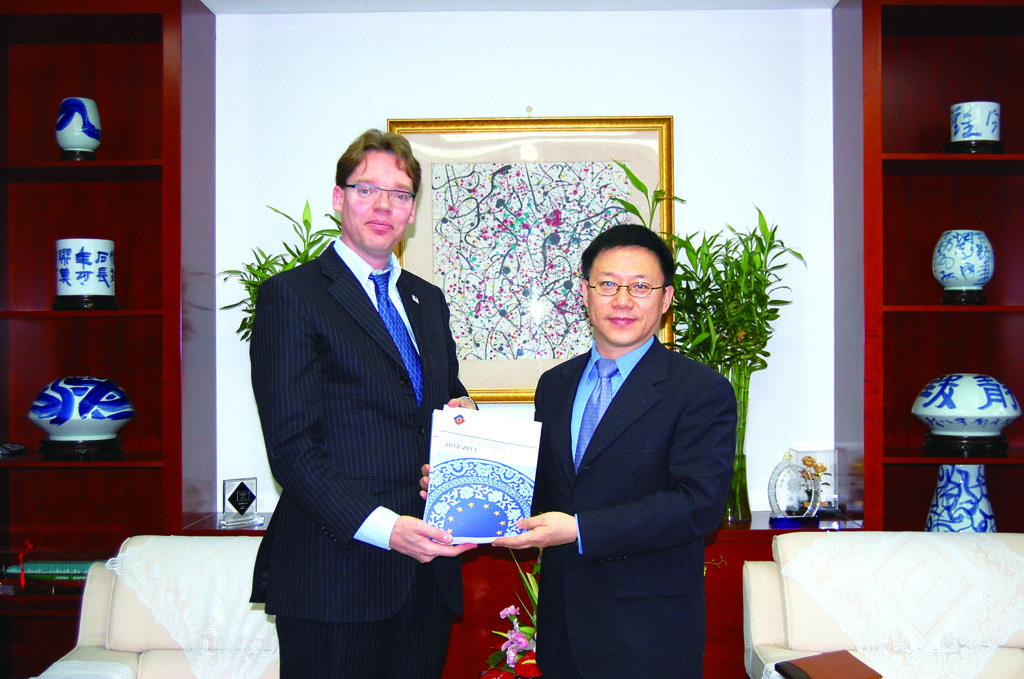
China Banking Regulatory Commission, 21st November 2012
What role do you expect the European Chamber to take in the next 20 years?
I expect the Chamber to continue to be the joint, united voice of European business in China. China will develop its own set of rules, but it is in the best interest of both China and European companies that ideas and suggestions are exchanged on how these set of rules can work out best for everyone involved.
Do you remember the European Chamber’s first government meeting you attended, who it was with and how you were received?
One of my first meetings as board member was with the Shanghai Ministry of Commerce (SCOFCOM) and Mr Sha Hai Lin, a very open-minded government official with a keen interest in the work of the European Chamber. It was the first of many pleasant meetings over a period of six years as we established a regular strategic dialogue with SCOFCOM. I also have pleasant memories of the first meetings with Dr Fan Xinghai (now vice chair of the China Securities Regulatory Commission) and the finance events we co-organised when he was still at the Shanghai Municipal Financial Services Office.
Do you feel that the Chinese authorities care about the Chamber’s messaging and recommendations?
Yes, they certainly do. They may not implement the recommendations, but the Chinese Government is always keen on collecting intelligence on what foreign companies in China are concerned about. The information that foreign companies provide via the different chambers of commerce feeds into the decision-making processes.
As you reflect on your time in the Chamber over the years, what comes to mind?
I fondly remember the Shanghai World Expo in 2010, with its European Union Pavilion. I had the opportunity to visit the Expo over 40 times as Shanghai chair, meeting with government leaders and business executives from all over the world. Shanghai seemed the centre of the universe for one long, hot summer. I also have good memories of the wonderful galas the Chamber organised. These were an ideal platform to meet other members, entertain clients and exchange ideas in an informal setting.
What is the best piece of advice you can give the European Chamber for the coming years?
Stay true to its vision and mission; they seem more relevant than ever.
Shanghai Local Position Papers
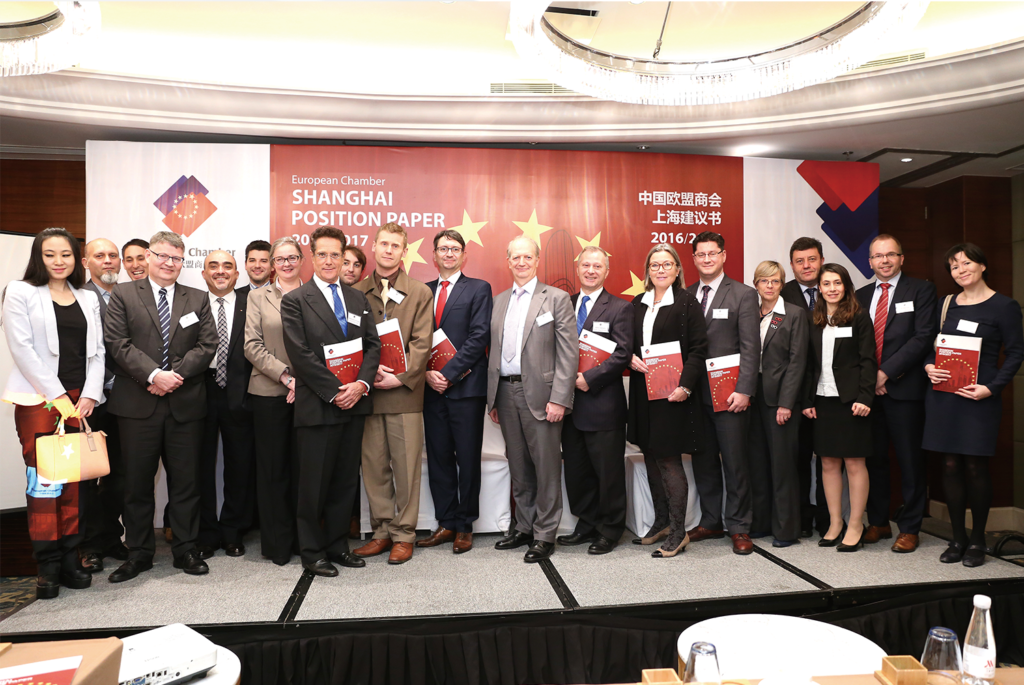
The European Chamber’s first standalone local position paper was the Shanghai Position Paper 2014/2015. It was compiled in 2014 and launched in January 2015, with local position papers for each of the Chamber’s other chapters following throughout the next year.

As Steven Sack, then chair of the Shanghai Chapter, said in his introduction to the position paper: “Each city, and region, in China has its own unique set of circumstances requiring a more tailored approach. Our lobbying priorities—while contributing to the overall improvement of the Chinese market and its operating environment in general—differ in each location, so there is a need for in-depth analysis and specific policy recommendations for each of these different regions.”
Having led the vanguard in terms of launching local position papers, the Shanghai Chapter has also published the most since then, with a total of four under its belt as well as a report on Chinese Government plans to turn the city into an international finance centre (IFC) by 2020. These plans were a main focus for the Shanghai position papers, all of which provided recommendations on how the authorities could speed up preparations to realise the IFC goal. However, the title of the chapter’s report on the IFC plan indicates the authorities’ success: Not Yet, Maybe Later.
The Shanghai Position Paper 2020/2021 unfortunately is mainly focussed on recommendations for the post-COVID-19 recovery of a city that is considered China’s most ‘international’, alongside advice on how to make the most of plans for the development of the Yangtze River Delta region.
Sustainable Business Awards and European Chamber’s 20th Anniversary Cocktail Reception
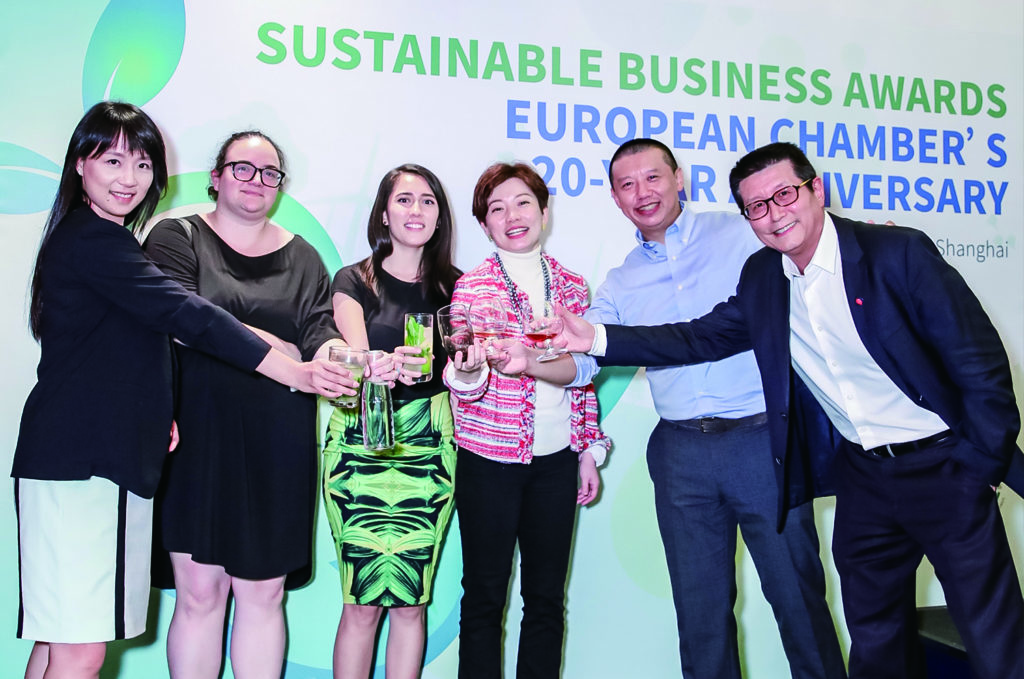
The Shanghai Chapter’s 4th Sustainable Business Awards took place on 17th September 2020, combined with a cocktail reception to celebrate the European Chamber’s 20th Anniversary.
The objective of the Sustainability Awards is to highlight innovation leadership achievements, advance sustainability awareness and promote responsible business models to organisations in China.
The European Chamber Sustainability Business Awards have been continuously improving, growing and promoting awareness since being established in 2017. Thanks to feedback from the experts involved in the awards, each year categories, criteria and requirements are adapted to best reflect corporate social responsibility (CSR) standards. Notably, our award categories closely follow United Nations (UN) Sustainable Development Goals’ and China’s long-term policies on poverty alleviation and environmental protection.
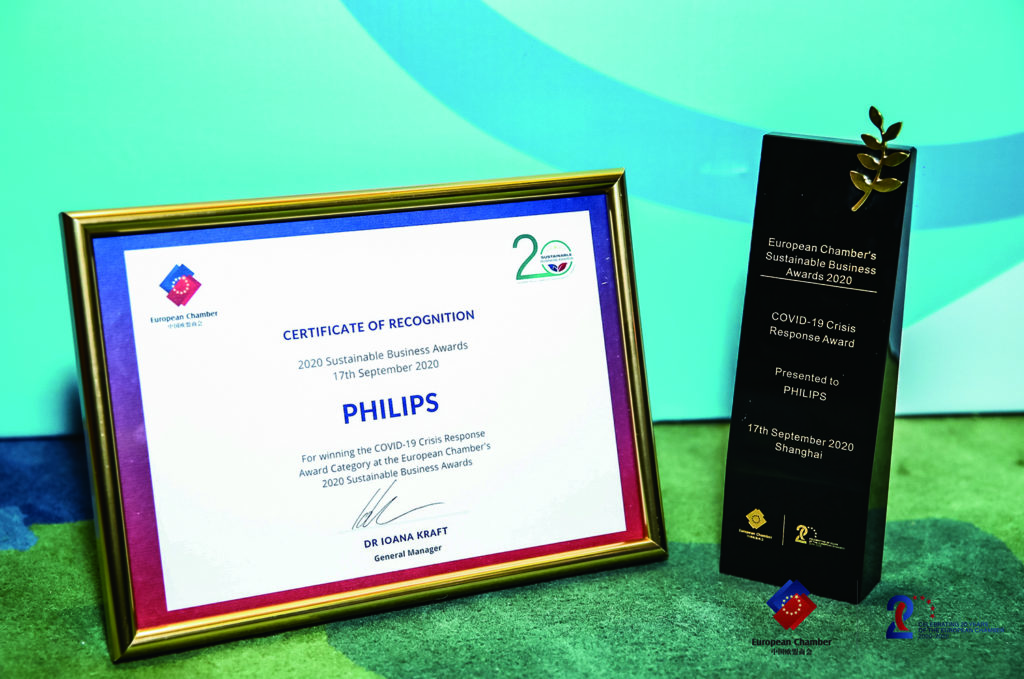
This year, the Sustainability Awards were open to both members and non-members, with five categories available for applications. The 2020 Sustainable Business Awards winners are:
- Advocate in Combating Poverty
- Danone
- COVID-19 Crisis Response Award
- Novo Nordisk, Philips, Signify, University of Nottingham Ningbo China (UNNC) and Volvo Group China
- Navigating Diversity and Inclusion
- SAP
- Outstanding Environmental and Climate Performance
- Bosch, Stora Enso and Waste2Wear
- Social Innovation Pioneer
- Covestro


Recent Comments